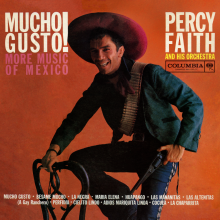Mucho Gusto (More Music of Mexico)
Availability
Lp (mono): Columbia CL 1639 (USA)
Lp (stereo): Columbia CS 8439 (USA)
CD: Collectables COL-CD-6057 (2-on-1 with Passport To Romance) (USA)
About This Album
Cover photo: Columbia Records photo studio—Henry Parker
Liner notes
Once again, Percy Faith and his band of Mariachis arrive beneath our balcony to present another album of the music of Mexico. To all of you who so enjoyed Percy’s first album of Mexican music, Viva! (CL 1075/CS 8038), we must apologize for taking almost five years to fill requests for a sequel. But Percy has been busy. Since Viva! he has recorded: the music of Gershwin and Victor Herbert; the music of Cuba while he could still visit the island; music from motion pictures including Porgy and Bess and A Summer Place; the scores of the Broadway hits The Sound of Music and Camelot; three albums of great popular favorites in which his unique arranging talents brought new life and beauty to the music of other composers (Bouquet, Bon Voyage and Jealousy); and an album of his own compositions, Carefree. (In fact, Carefree reveals more about Percy’s musical tastes and styles than any other, for this is his own music, which describes in a composer’s personal language a world full of places and people he has remembered.)
But all the while, Percy has talked of another group of Mexican compositions. For in the music of this country seems to lie the essence of Percy’s own musical enthusiasms, the perfect reflection of his varied style. Now he has found, once again, a half dozen familiar melodies, perfectly suited to the soaring string sound of his orchestra. He has found, too, another half dozen inspirations for his famous rhythmic vigor, punctuated with the wonderful sounds of shakers, scratchers, clappers, and whip cracks. And now that Percy has moved to California, the scent of tacos, enchiladas, and beans is wafted over the mountains to his front door as a daily reminder to begin making music, Mucho Gusto!
The album begins with the title song, an original composition by Percy as his tribute to Mexico and its gifted musicians. Mucho Gusto! is a wild, galloping tune filled with whistles and whip cracks. It features brass and three guitars as a rhythmic phalanx. Besame Mucho is the famous hit by Consuelito Velasquez, who still lives in Mexico. Over the stereophonic conversation of tambourine and maracas, soft strings and woodwinds carry the melody. La Negra is typical son from Jalisco, featuring solo trumpet and the fury of a colorful Mexican dance rhythm. Lorenzo Barcelata’s famous Maria Elena has been the subject of a fine Mexican mystery for many years; while the song is obviously a beautiful serenade to a beautiful woman, Senor Barcelata’s wife was named Maria Theresa. Percy’s cascading strings, a solo guitar with cello counterpoint, and woodwinds are featured.
Moncayo is one of Mexico’s two or three most famous composers. Huapango, featured here, is an excerpt from his longer work adapted by Percy for this album. Again, the Mexican flavor of trumpet, guitar, and tambourine is highlighted. Las Mananitas is a song played most often on a Saint’s Day or birthday by the Mariachis, the strolling players who got their name form the French word for marriage. It is a moment of romance, a melody for the pretty girl who listens on the balcony.
Las Altenitas is a tune identified with the girls of the mountains around Guadalajara, full of gaiety and color. High strings and an easy dance rhythm are Percy’s choice for Perfidia, perhaps the most famous of all Mexican songs. An Cielito Lindo is almost as well known. Percy uses muted strings and woodwinds for this famous waltz. Adios Mariquita Linda is a Mexican “goodbye” song, again familiar to most of us north of the border. Cocula is a little town near Guadalajara, and this charming arrangement describes it. Finally, La Chaparrita ends the album with slow, stately rhythm, a melody for strings which seems to sum up the beauty and life of this music and Mexico.
Irving Townsend

